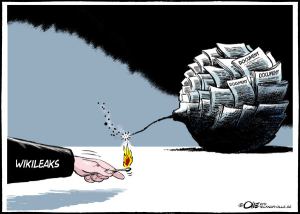 The person sat opposite is clearly in their own little world. The headphones are in whilst they tap furiously away at whichever screen is in front of them, and not once do they look up to see what’s going on around them. God only knows how they manage to get off at the right stop without looking. Oh wait, there’s probably an app for that. On closer inspection almost everyone on the train is in a similar self-styled, heads down screen bashing bubble. Come to think of it, you too are probably part of this craned neck cult.
The person sat opposite is clearly in their own little world. The headphones are in whilst they tap furiously away at whichever screen is in front of them, and not once do they look up to see what’s going on around them. God only knows how they manage to get off at the right stop without looking. Oh wait, there’s probably an app for that. On closer inspection almost everyone on the train is in a similar self-styled, heads down screen bashing bubble. Come to think of it, you too are probably part of this craned neck cult.
Take an earphone out for a second and you might well be shocked at the relatively calm, quiet environment that you’ve found yourself in. You may come to the conclusion that a crowded commuter train full of people should probably make more noise than this. And you’d be right. Where has all the chatter gone?
Well one place that it’s certainly not quiet is in the world of the virtual sphere that many of the passengers have found themselves in. In there you can hardly hear yourself think. Looking around it may not be so obvious but look a little closer at what people are doing and you’ll begin to notice that the hustle and bustle that you’d expect to take place on such journeys is still going on, except now it’s silently (if you excuse the faint click, click, click of keyboards and tttss, tttss, tttss of the earphones around you) funneled into the virtual world.
According to Sherry Turkle’s new book we are ‘Alone Together’ in such spaces. The book provides concrete evidence to back up what we’ve all been thinking for some time: I.E. technology has a tendency to make us all anti-social beings in the real world. In many ways Turkle is profoundly correct which comes as no surprise considering she is one the leaders in the this field of research, but since reading the book I have come to think that we haven’t necessarily become completely anti-social in real world public spaces as a result of new technologies. Rather I would like to suggest that it depends on the type of public space, be it physical or virtual, which determines how sociable we are in such spaces.
Putting (my) attitudes towards the impact of technologies on social dispersion aside, I want to argue that of course we are still sociable in real life public spaces but instead of conversing verbally we now tend to converse virtually. It’s human nature to chat so obviously it’s not at though we now socialise less on the way home from work than we used to, far from it. There’s plenty of evidence to suggest that we now converse with more people than ever with the aid of the Internet. We are just not socialising with those physically around us anymore. Instead we are now socialising with others in virtual spaces, mainly through social media unsurprisingly.
In effect we have become less sociable and more private in offline public spaces and (arguably) more sociable and public in online spaces. The ‘glass screen’ as some have named it, has left people feeling more comfortable expressing themselves online rather than offline hence why we’re more likely to publish a widely outrageous rant about our day via Twitter or Facebook than publish it verbally to those sitting around us. Anyone seen doing that today is likely to face a wall of bemused faces. You only have to look into the eyes of those around you as a someone tries to spark up an innocent conversation with the person sat opposite to realise that people have become uncomfortable with the publicness of strangers. And yet the irony is that they’ll probably get home and Tweet about it to a number of strangers in complete comfort. There is, however, most likely a cultural distinctiveness to this type of behaviour. From my own experience an American is far more comfortable talking to strangers than a Brit for example. For the purpose of this post however, I am mainly concentrating on the day-to-day life of a Londoner. In other words a social mute in the company of strangers.
This theory of a more private public is nothing particularly new. Many, once social, interactions have now become private solo activities. In most cases this can be accredited to technology. That wonderful thing we buy into with every new gadget is, without doubt, making us more ‘alone’ in everyday social settings. For example if you’ve take a trip to the supermarket in the past five years, you’ll have noticed that the number of self-service checkout’s has increased significantly. If you haven’t, then maybe you’re ordering online which proves my point beautifully. Furthermore, many people have something in the form of in-ear entertainment for their daily commutes rendering themselves ‘out of this world’, and if you’re really tech-centric then you’re likely to have a big glossy screen to stare at. On the surface it may seem as if all this technology is making us more introverted, isolated beings. This however is not strictly true. On the contrary, in many cases we now just live our extroverted lives via the virtual spheres of social networks, sms and community forums.
The irony of Mark Zuckerbergs now infamous ‘the age of privacy is over’ comment is wonderfully apt for this argument as it only really applies to the virtual world which he so fully embraces. Take a look at the offline world as it’s quite apparent that we are inherently more private in public since the Internet explosion. The age of privacy maybe over in relation to the online world but it seems to have only just begun in the offline world. Moreover people seem to have taken to the notion of a more private public with ease. Some busy rail stations now have considerably more self-service ticket machines than they do staffed ticket booths. This says something about cost reduction and station efficiency but it’s also a clear reminder that people like to go about their business in a solitary manner.
*
Turkle argues that this way of socialising, virtually as opposed to face to face, is a negative effect of our increasing reliance on technology in day-to-day life. In many ways she is right. If we rely on technology for communication too much then we run the risk of becoming completely inept in real life social situations. The added time technology provides us with for presentation of the self has meant that we now have longer to decide how we want to come across to others, which is damaging when we come to face to face with other people as this type of interaction requires that we act on impulse. A Tweet for example can be carefully crafted over a five-minute period whereas it you left it five minutes before answering a question from someone in front of you, it is more than likely that you’ll have some trouble continuing that conversation.
One problem with this theory that I’m sure you’ve already noticed is that we rarely use the added time technology provides us with effectively to make any more of a considered outburst on social media than we would in the physical world. You only have to look at a daily newspaper to see how another idiot has done irreparable damage to his/her reputation by what they’ve posted on Twitter in the spur of the moment after a few pints.
Why is it that we have no trouble broadcasting our thoughts to others in an online public space but if asked to do the same thing in an offline public space we would more than likely decline? It’s as though we want to be more social but seemingly only behind an online guise even if it’s clear that such as guise does little more to protect our identity than a clear bubble would in real world public spaces. Facebook already does its best to confirm the identity of its users and Twitter is not far behind. Will the lack of complete anonymity (which is inevitably on its way) on such sites alter the way we behave in the virtual public spaces of the future? I’m not sure but it does seem for the moment that we feel safe behind a ‘glass screen’ in a way which we do not sitting amongst strangers on a busy commuter train.
n.b. So far these ideas are just sketches. I acknowledge that there is an issue here with the definition of a public space but for the moment lets just assume that a public space is an ‘absolute’ space open to most, shared by a self and at least one stranger. Feel free to comment.










